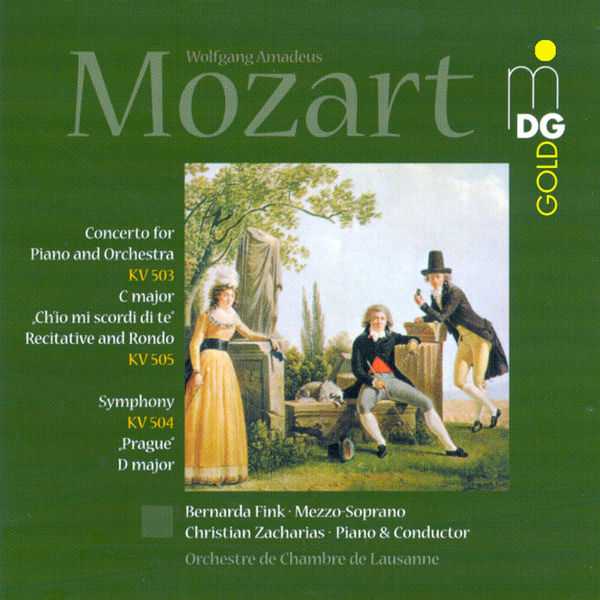
Composer: Wolfgang Amadeus Mozart
Performer: Bernarda Fink
Orchestra: Orchestre de Chambre de Lausanne
Conductor: Christian Zacharias
Format: FLAC (tracks)
Label: MDG
Catalogue: MDG3400967
Release: 2000
Size: 249 MB
Recovery: +3%
Scan: cover
Symphony in D Major, K. 504
01. I. Adagio – Allegro
02. II. Andante
03. III. Presto
Recitative and Rondo K. 505, “Ch’io mi scordi di te” for Soprano, Obbligato Piano and Orchestra
04. Recitativo – Rondo. Andante
Concerto for Piano and Orchestra in C Major, KV 503
05. I. Allegro maestoso
06. II. Andante
07. III. Finale. Allegretto
Here Christian Zacharias successfully experiments with a nicely balanced Mozart group of symphony, aria and concerto. He himself takes multiple roles, conducting a fresh and lively account of the Prague Symphony, and acting as piano soloist not only in the Concerto, directing the weighty K503 from the keyboard, but also providing a crisply pointed obbligato in the most taxing of Mozart’s concert arias, Ch’io miscordi di te. The sense of freedom and spontaneous enjoyment is enhanced by the clarity of the recording, made in the Metropole, Lausanne.
Though tuttis are big and weighty, Zacharias finds rare transparency in lighter passages, and a vivid sense of presence throughout. One of Zacharias’s great merits as a Mozart pianist is the crispness of his articulation; he defines each note with jewelled clarity.
The Symphony, too, is given a refreshing performance, with due weight in the first movement and light, crisp articulation in the finale.
Some may feel that Zacharias underplays the gravity of the central Andante, but nowadays few will object to a flowing tempo such as one expects in a period performance.
Most striking of all, though, is the concert aria.Bernarda Fink, officially a mezzo, isn’t just untroubled by the soprano tessitura but gives a characterful interpretation, pointing words and phrases with delightful individuality. Using her lovely creamy tone-colours, Fink offers one of the most impressive of all readings since Schwarzkopf’s. Her contribution crowns a consistently enjoyable programme.



